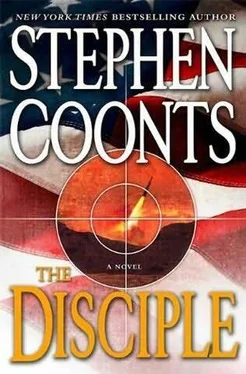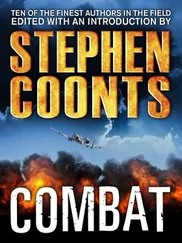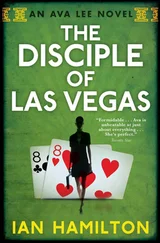Stephen Coonts - The Disciple
Здесь есть возможность читать онлайн «Stephen Coonts - The Disciple» весь текст электронной книги совершенно бесплатно (целиком полную версию без сокращений). В некоторых случаях можно слушать аудио, скачать через торрент в формате fb2 и присутствует краткое содержание. Жанр: Триллер, на английском языке. Описание произведения, (предисловие) а так же отзывы посетителей доступны на портале библиотеки ЛибКат.
- Название:The Disciple
- Автор:
- Жанр:
- Год:неизвестен
- ISBN:нет данных
- Рейтинг книги:4 / 5. Голосов: 1
-
Избранное:Добавить в избранное
- Отзывы:
-
Ваша оценка:
- 80
- 1
- 2
- 3
- 4
- 5
The Disciple: краткое содержание, описание и аннотация
Предлагаем к чтению аннотацию, описание, краткое содержание или предисловие (зависит от того, что написал сам автор книги «The Disciple»). Если вы не нашли необходимую информацию о книге — напишите в комментариях, мы постараемся отыскать её.
The Disciple — читать онлайн бесплатно полную книгу (весь текст) целиком
Ниже представлен текст книги, разбитый по страницам. Система сохранения места последней прочитанной страницы, позволяет с удобством читать онлайн бесплатно книгу «The Disciple», без необходимости каждый раз заново искать на чём Вы остановились. Поставьте закладку, и сможете в любой момент перейти на страницу, на которой закончили чтение.
Интервал:
Закладка:
“Hello,” I said in English to the one-legged man who seated himself before me. He had been waiting upstairs since the annex opened. He had a crutch, no artificial leg. He was maybe forty-five, with a big mustache and grizzled jowls.
“Hello,” he said back, also in English, and passed me his form.
I looked at it. His name was Abdullaziz Nasr Qomi. I didn’t recognize the name of his village, so I asked him about it in Farsi, or Persian. I attended a crash course to learn the language before I came over here-but more on that later.
His face brightened a little as he told me about his village, a little place near Takab, which I knew was west of Tehran and up toward the big lake, Urmia.
I listened to him talk, getting most of it despite his regional accent. I glanced at his hands and saw they were heavily callused. This guy wasn’t a bureaucrat or apparatchik.
He worked in construction, Qomi said, was a day laborer. He paused and then said heavily, “I want to go to America.” Since we were praying over a tourist visa application, he added, “For a visit.”
“How’d you lose your leg?”
“The war with Iraq. I was in the Martyrs Brigade. I stepped on a mine. I was ready to die, ready to go straight to Paradise, but I didn’t. I am still here, with only one leg.”
“Must be difficult for a one-legged man to make a living in Iran.”
He didn’t reply to that, merely lowered his head.
I confess, I liked the guy. Qomi was tough, and he’d obviously been through the mill and survived. I have little sympathy for victims, but I really like survivors. My ambition is to be one myself.
“You married?” I asked, then glanced at the form. He had marked NO.
He still had his head down.
“Whom do you know in America?” I asked, not waiting for an answer. “Who are you going to visit?”
He started telling me about his cousin who finished concrete in Queens. As he talked I sat back and glanced around, at Frank Caldwell, who was interviewing a weeping woman in a chador, and at this dingy, damp little room.
I recalled the day that Jake Grafton called me in, told me he wanted me to do an intensive course in the Persian language, then go to Iran. Three months later, I got the language completion certificate, written in English and Farsi; I was ready to trade insults with Cyrus the Great. I reported back to Grafton at the Company headquarters in Langley.
Jake Grafton was a retired naval officer, an attack pilot, retired as a two-star, and for years he had been the go-to guy when… shall we say, “situations” developed and the politicians or Pentagon brass needed some serious help with their hot chestnuts. Finally they gave him a job in the Company. He was smart and tough as shoe leather, and if he was ever afraid, it never showed. In addition, he was a genuine nice guy, but I don’t think he wanted anyone in the agency to know that. Believe me, this outfit operated on the theory that nice guys finish last. In the spy game, they often did, so maybe Grafton was the exception that proved the rule.
Me? Of course I’m a nice guy-my mother would sign an affidavit to that effect. However, there is a lot she doesn’t know. In fact, she is in the dark about 99.9 percent of the stuff I do. She knows that I live in suburban Maryland; she sends me birthday and Christmas cards. I think she knows that I work for the agency, but maybe not. I might have lied about that. She didn’t mention it during my last visit, so I didn’t either.
The sad fact is I tell a lot of lies. Most of them are professional, in the line of duty, so to speak, but every now and then a personal lie slips out. Maybe it’s habit; the darn things pop out before I can stop them, more smirches on my character. Perhaps it’s just my criminal mind. Whatever, I’m still a nice guy, and you can take that to the bank.
One April Tuesday a few days after I finished the language course, we were settled in Grafton’s office talking about the state of the planet and the people on it, just covering the ground, so to speak, when he said, “I want you to go to Iran next week. You’ll be attached to the American Interests Section as a visa officer.”
I nodded. I’m not the swiftest guy you ever met, but after doing the language course, I had an inkling this was coming. I had hoped it would come later, much later, but my luck doesn’t run that way. Persia, which is presently the Islamic Republic of Iran, complete with mullahs, religious facists, holy warriors and throat-slitters, plus tens of millions of folks just trying to pay their bills and stay alive. Am I lucky or what?
Grafton’s desk phone buzzed and he got it. “Yes.”
He listened a moment, then hung up. “I have to go to a meeting,” he said as he unlocked his safe, which was beside his desk. He pulled the safe door open and handed me a sheet of paper from the gloomy interior.
“Here’s the access codes to the file I want you to read. Look it over, then come back to see me.”
I went to the converted broom closet the Company so blithely labels my office and shoved aside the mountain of read-and-initial crap that had accumulated on my desk during my absence and I hadn’t had time yet to go through. I fired up my desk computer.
The Company is trying to go digital, but very carefully. The last thing on earth anyone in the building wants is a hacker getting into our files. Or worse, a foreign intelligence service. Still, the advantages of going digital are so attractive that we are trying.
Three or four screens into the file, my hands started to sweat. Then my forehead. I had to take off my sports coat and hang it over the back of my chair.
Mahmoud Ahmadinejad, the current president of Iran, was a real piece of work. Born in the provinces, his devout father changed the family name to Ahmadinejad, “virtuous race” or “Muhammad’s race,” when he moved to Tehran in search of a better life. Young Mahmoud studied mathematics at a private school, then went off to the university in 1975. By all accounts he was very devout. In any event, he fell in with the religious political movement, which was moving toward revolution against the shah. The head revolutionary was Ruhollah Khomeini, who preached a vision of a society led by zealous, uniquely qualified Islamic leaders who would control the “simple-hearted” lower classes. This Islamic Bolshevik went further: He believed that anyone who rejected his ideas, which one critic, Alireza Jafarzadeh, said were “dogmatic, rigid, feudalistic, medieval ideas contrary to the true teachings of Islam,” was not a Muslim. Like Vladimir Ilyich Lenin and the legion of tyrants who had slashed their way through history before him, Khomeini was an all-or-nothing guy. Ahmadinejad signed on early; he was one of the first to join the Islamic Revolutionary Guards Corps while at the University of Science and Technology.
After the shah was routed in 1979, Ahmadinejad joined the Intelligence Unit of the IRGC, which Khomeini put together to defeat his political enemies following the collapse of the shah’s secret police service, the SAVAK. This Irani an version of Hitler’s Brownshirts operated with no constraints on their methods. Ahmadinejad was right in the middle of it. He was in Khomeini’s inner circle in those days and probably helped plan the takeover of the American embassy in November of 1979. There was some debate about whether he was in the first wave that scaled the walls, but he was definitely there shortly thereafter, in charge of the guards and watching the interrogation of American prisoners. He might even have been in charge of interrogations.
There were a couple of photos in the file of Iranians mobbing the U.S. embassy. A figure in each had been circled and labeled as “possible.” I whipped out the magnifying glass that all good agency employees keep in their desk and studied the faces within the circles.
Читать дальшеИнтервал:
Закладка:
Похожие книги на «The Disciple»
Представляем Вашему вниманию похожие книги на «The Disciple» списком для выбора. Мы отобрали схожую по названию и смыслу литературу в надежде предоставить читателям больше вариантов отыскать новые, интересные, ещё непрочитанные произведения.
Обсуждение, отзывы о книге «The Disciple» и просто собственные мнения читателей. Оставьте ваши комментарии, напишите, что Вы думаете о произведении, его смысле или главных героях. Укажите что конкретно понравилось, а что нет, и почему Вы так считаете.












